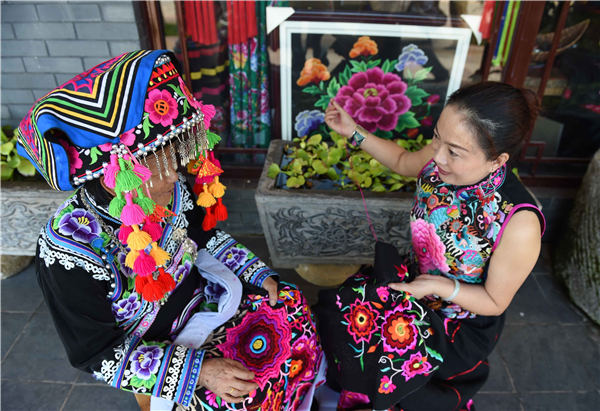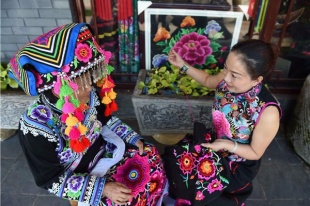Threading tradition into the present day


Traditional craft of the Yi ethnic group enjoys a strong renaissance.
Since her childhood, when she would watch her mother at work, Luo Jun has been pursuing her ambition to preserve the traditional embroidery of the Yi ethnic group and bring real benefits to her fellow embroiderers in Yunnan province.
"Embroidering has been part of my family for generations, like many other families in Yi communities. My mother was highly skilled in Yi-style needlework and costume-making. Her work formed my first impressions of beauty," Luo said.
Locals have a saying that Yi women can embroider as long as they have a needle and thread.
However, Yi people have another custom; children should burn the embroidery of their mothers after they pass away.
"When my mom told me that, I burst into tears and wanted to keep the traditional craft alive," she said. "So, like many other Yi girls, I started to learn embroidery."
Luo also understood that a love of needlework would not enough to keep the skill alive. She would have to find another way. So she started a company.
The company, focusing on Yi-style embroidery products, was established in 2009.
Local women get paid for their embroidery and the raw materials are provided by the company, which provides the necessary training and then sells the products.
By starting her own business, Luo, chairman of the Miyilu Ethnic Costume Co., has managed to fulfill her ambition and at the same time given an opportunity to local women to make a living through their needlework, and in turn pass on the traditional skills to another generation.
Helping others
Many people living in mountainous regions have few ways to make living aside from farming.
But after training, embroiderers can earn as much as 70,000 yuan ($11,100) a year working for her company, an exceptionally high salary for people living in mountainous Dayao county in the Chuxiong Yi autonomous prefecture, one of the country's two prefectures for the ethnic group.
In 2010, only 36 women joined the company so Luo started to organize training to inform women about the skill and the demand for the embroidery.
In the first few years, the company did not turn a profit. At that time, even Luo herself had little concept of "making a product". But her passion drove her on. And the business grew, with more local women joining. But selling the pieces was still difficult.
"Embroiderers know how to make, but they don't know how to sell," Luo said.
But she persevered. After conducting research and surveys, the company discovered more about their potential market and what customers might want.
The company then started to offer training courses on new patterns and designs. Meanwhile, more products were offered, ranging from pillows, wallets to decorations for vehicles.
The company's strategy finally paid off. Now more than 3,000 embroiderers work for the company and its revenues were more than 20 million yuan last year, a year-on-year increase of more than 25 percent.





































